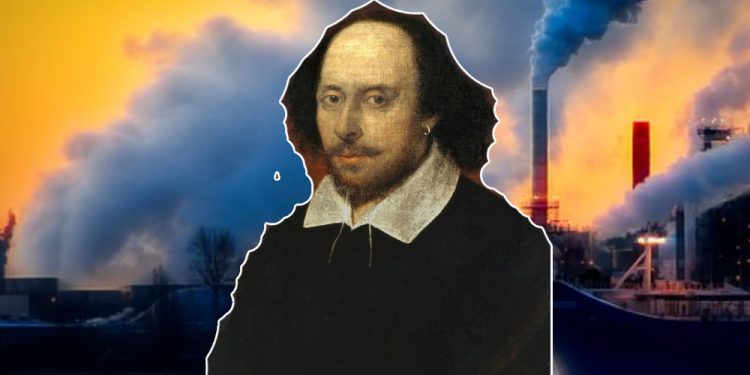Huddersfield (UK): Climate change, urban sprawl, air pollution, deforestation, depleted fish stocks, biodiversity and species loss: these are not exclusively modern problems that only sprang up in the last few hundred years.
In fact, the common but misleading phrase “industrial revolution” masks the long history of resource extraction and ecological degradation in the British Isles stretching back at least to the arrival of the tin-hungry Romans.
Renaissance England was reeling from the effects of all these problems. Often hailed as the golden age of English literature, the Renaissance was also the apex of the “little ice age”, in which a cooler climate produced poorer harvests.
These food shortages were especially difficult because England’s human population surged fourfold in the 16th century, while the enclosure of common lands forced more country-dwellers to flock to London.
Given how heavily these environmental concerns weighed on a society coping with chronic scarcity, it should come as no surprise that we can find traces of them in the works of England’s greatest playwright.
King and countryside
When King James became his patron in 1603, Shakespeare was tasked with writing plays to entertain a keen outdoorsman and hunter who was as much preoccupied with the material state of the British countryside as with matters of state.
No wonder, then, the Shakespearean stage encompasses a remarkable variety of landscapes and features an abundance of animal imagery to rival the royal menagerie – basically King James’s private zoo – and compensate for England’s dwindling numbers of wild game.
It would, of course, be an anachronism to dub Shakespeare an environmentalist. But he was acutely aware of what we would term the environmental issues of his era. In particular, the plays Shakespeare composed during the reign of James frequently intervene in environmental policy disputes at the Stuart court about how best to carve up the natural riches of the realm.
Macbeth’s famous depiction of the “blasted heath” reflects the increasingly negative views of this terrain as a sterile abode of witches and Romani people that should be transformed into private farmland.
Although James dreaded witches, he and parliament sought to protect heathland as a habitat for game animals and birds. He would have relished Shakespeare’s comparing Macbeth to a poacher and a kite, a species then classified as vermin.
Macbeth’s killing of Duncan and Macduff’s (pronounced Macdove) family simulates illegal net-hunting, nest-robbing, and the raiding of estate buildings known as dovecotes, which housed pigeons and doves for food and feathers.
Enduring environmental issues
In Pericles, Shakespeare wades into pan-European squabbles about fishing rights amid a crash in North Sea fishing stocks. Its conclusion mirrors James’ plan to end the herring wars (the ongoing feud between England and its coastal neighbours over territorial control of fishing areas) by forging dynastic alliances through the marriage of his heirs.
Interestingly, Pericles also plays on fears of coastal erosion. Shakespeare adapted the story from a writer whose father had proposed the existence of a flooded land-bridge linking Britain to the continent (now known as Doggerland).
While the shipwrecked king refutes claims to rule the unruly seas, the costumes donned by Shakespeare’s actors would have told a different story.
Pericles and his family almost certainly appeared in robes of Tyrian purple. This dye, made in Pericles’ home town from crushed sea snails, could only be worn by royalty and would thus have been a striking visual symbol of royal dominion over the ocean.
The Winter’s Tale comments on the inhumanity of the fur trade. The famous bear that pursues Antigonus off stage may have been played by an actor in a polar bear’s pelt captured by fur traders, while Queen Hermione is a personification of an ermine.
Spelled “ermion” in Shakespeare’s day, an ermine is a stoat in its white winter coat. Ermines were symbols of chastity since it was believed they would rather die than befoul their white fur.
Hermione acts like her namesake when she exclaims she too would rather die than stain her name as an adulteress.
The trial scene in which she would be stripped of her white fur re-enacts the flaying of an animal, while the scene in which her statue is reanimated captures a fascination with the new, death-defying art of taxidermy.
King Lear proclaims humans no better than beasts and is a tour de force demonstration of our vulnerability to both extreme weather and darkness.
In Cymbeline, Shakespeare expresses a newfound appreciation for mountain wilderness as a preserve not only of game animals but also of Britishness and masculinity.
Few people realise The Tempest is based on legends of a demon-battling hermit from the English fens. Its notorious monster Caliban voices the outrage of fenland communities dispossessed by schemes to drain and enclose their wetlands.
Measure For Measure reveals how the plague stoked fears of urban overpopulation, while Timon of Athens offer’s a scathing satire on the mining lobby and its cornucopian economics: the notion that the earth’s wealth is inexhaustible.
In inserting these environmental issues into his plays, Shakespeare forced his audience to reflect on the political, moral, and spiritual implications of early modern England’s growing power to transform the natural world.
His fascination with kings might seem old-fashioned, but in our brave new era of the Anthropocene, in which our species has become the dominant geological force, we can better appreciate how he often uses kingship as a metaphor for human tyranny over nature.
Shakespeare’s profound sympathies for the disempowered outsider also extend to non-human creatures. When his high and mighty despots have their comeuppance out in the wilds, learning that the earth doesn’t exist to bend to them, Shakespeare’s plays are teaching us all to relinquish the delusion that we are entitled to dominate the planet.
The Conversation






































